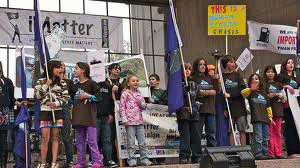(this is the second of two articles on the role of adolescents in mass uprisings)
Psychological oppression (manifested by widespread apathy and resignation in the face of major corporate and government attacks on working Americans) is at an all time high in the US. Historically (see my article Teenagers: God's Answer to Psychological Oppression about the Soweto uprising and Palestinian Intifada), it's often a strong and sustained youth rebellion that enables a society to throw off severe psychological oppression. This makes me naturally curious about the chances of a youth resistance movement developing in the US . The following is a breakdown of the forces I see favoring and countering the formation of a generation Z uprising in the US :
The demographics:
- 35% of the US population is under 25.
- Total unemployment among age 16 -25: 24-25%, with many facing permanent unemployment.
- Percent of non-white unemployed youth: 46%
- Unemployment among African Americans under 25: 40.7%
- Unemployment among Hispanic Americans under 25: 35%
(Source: http://laborcenter.berkeley.edu/press/aflcio_july11.shtml and http://westorlandonews.com/2011/07/15/hispanic-youth-unemployment-rate-jumps-to-35-percent/).
Forces favoring a generation Z uprising:
- Extremely high levels of teen homelessness (which I discuss in detail below)
- Excessive parental work demands, leading to a general breakdown of parental authority
- Reduced influence of the middle class (which is being systematically dismantled) and the conservatizing influence of teachers, lawyers, ministers, social workers, who play a critical role in setting standards for appropriate behavior
- Increasing non-white demographic, coupled with high unemployment among minority youth
Forces countering a generation Z uprising:
- Highest rate of imprisonment (which disproportionately targets youth and minorities) in the industrialized world.
- Widespread availability of illicit drugs to dampen youth resentment and anger, especially in minority communities. Ever since the opium wars in China , addictive drugs have been a favorite weapon of the British and American elite to suppress resistance movements. The late Gary Webb and other who have studied CIA involvement in narcotics trafficking have documented disproportionate targeting of minority neighborhoods with both heroin and crack cocaine. This is no accident.
- Heavy uptake by US youth of addictive social media platforms (Facebook, Google, Twitter and YouTube), which have all been heavily financed and penetrated by US intelligence.
Psychological Oppression in Middle Class Teens
Clinical psychologist and social commentator Dr Bruce Levine recently published an article on Alternet about American societal institutions that tend to crush young people's natural spirit of resistance. Levine, who seems more focused on middle class youth, has come up with a somewhat different list of contingencies. However his article quite elegantly summarizes the early influences that create the fearful and compliant American middle class persona and is well worth a read (see 8 Reasons Young Americans Don't Fight Back).
The institutions Levine highlights as inducing compliance, as opposed to rebellion, include student-loan debt, the uniquely American tendency to medicate noncompliant and rebellious children and teens, American schools that educate for compliance rather than democracy, normalization and fear of surveillance, the "three screens" (TV, computers and cellphones), and "fundamentalist" consumerism (the belief that all human needs can be met by buying something).Except for fundamentalist consumerism and the "three screens," the forces Levine describes strike me as much more applicable to middle class teenagers than to the working class (which comprises more than 80% of the population). For example, while pressure to repay student-loan debt might have been a pacifying influence a decade ago, working class generation Y and Z students are unlikely to take on a $60,000 debt for college in a deteriorating US economy.
Likewise, in my experience schools are only a strong conservatizing influence where parents respect the teachers, principals and counselors who run them. In working class families (such as my own), there tends to be a healthy degree of skepticism towards educational professionals -- who are often viewed as a kind of thought police passing judgement on low income families. Anyone who has attended or taught in inner city schools is aware that middle and working class students part ways in junior high school. Middle class students are well-conditioned to be in class when the bell rings. In contrast, lower income kids congregate in the halls during class. Their primary motivation for attending school is to fulfill social needs. This minor group rebellion inoculates them against the more oppressive aspects of public education, as well as setting the stage for stronger social networking (and hopefully group rebellion) in later life.
Teen Homelessness: An American Disgrace
No one disputes that teen homelessness is both the strongest and most alarming symptom of the disintegration of US society. Homeless children and teenagers under 18 represent one-third of the US homeless population. 2.8 million American children have at least one episode of homelessness every year, while 1.35 million American children are permanently homeless. It's not a new problem. Seattle first became concerned about their homeless teens in the 1990s, and in 1999-2000. Shortly before moving to New Zealand , I worked with a community clinic with a special outreach program to address their mental health needs.
Approximately ten percent of homeless teens had access to state and city-run shelters prior to the 2008 economic collapse. However owing to extreme state and city budgetary difficulties, most have been forced to close.
US Teen Homelessness Rivals the Third World
In third world countries, homeless children are called "street kids." The US government prefers to call them "unaccompanied minors." Giving it a fancy name on it doesn't hide the fact that rate of homeless American children per capita is worse than in some third world countries.
(Note: You can view every article as one long page if you sign up as an Advocate Member, or higher).






